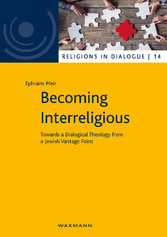Suchen und Finden
Service
Book Cover
1
Imprint
4
Table of Contents
5
Introduction
9
Chapter 1. The Necessity and Challenge of Interreligiosity
13
Choice
13
New values
14
A world-centered religiosity
14
The question of belonging
17
A different mindset: com-passion with others
18
“Trans-difference”
19
The transcendent
20
Uniqueness, communication and “trans-difference”
21
Distinctiveness and covenantality
23
Inspiration from Buber and Levinas
25
The other in Levinas’s ethical metaphysics
26
Plural society, religion and redemption of the subject
33
Remedies
35
Interreligious theology
36
A theology in touch with reality
37
Conditions for dialogue
41
Chapter 2. Hassidic Ingredients for Interreligiosity
49
Everyone is called
50
Everyone has his own way
51
A united soul
53
Start with yourself
54
Chapter 3. Violence and Peace in Religions
59
The violent side of human existence
60
Violent desire
60
Violent jealousy
60
False religiosity
61
Peace as proximity
62
Pursuing peace as disciples of Aharon
62
Truth and peace
63
Erasing God’s name in the name of peace
64
Learned people and shalom
64
Ask for the peace of Jerusalem for the sake of the neighbor, for God’s sake
65
The holiness of wholeness
65
Israeli-Palestinian conflict
68
Religious views on suffering
71
Mercy and its limits
77
God, a merciful Father and a righteous Judge
81
Chapter 4. Interreligious Teaching and Dialogue
85
Interreligious co-teaching
85
Hindu and Jewish perspectives on interreligious friendship
86
Jewish and Buddhist thoughts
91
Abraham and Ibrahim
97
Jewish and Alevite light
102
Buber and the Dalai Lama
104
Pascha and Pesach
108
Peace talks
112
Finkenwerder
113
Dr. Ramezani
115
Chapter 5. Interreligious Theology
119
John Hick
121
Dan Cohn-Sherbok
123
Michael S. Kogan
124
Theocentric Christians
125
Multiple religious belonging
128
Chapter 6. Between Christians and Jews
131
Openness in the Jewish tradition
131
Christian changes and Jewish responses
133
Nostra Aetate: a document of teshuva
133
Jewish influence on Nostra Aetate
135
Critical notes
137
Dabru emet
140
Jewish recognition of the legitimacy of Christianity
141
“Dabru emet” and religious Jews
141
Together towards the future
144
The American Jewish approach to Christianity and to Nostra Aetate
145
The inner-Jewish debate: Soloveitchik and Heschel
147
Judaism and Christianity: different and related
150
A psychological interpretation of Soloveitchik’s standpoint
151
No religion is an island
152
An outstretched hand to Christians
153
Statement of orthodox rabbis on Christianity
154
Jews reaching out to Christians: the case of Rosenzweig
155
The rays or the eternal way
156
Buber and interreligious theology
164
The category of presence
164
The art of translating
166
Relation to Christianity
167
Differences and trans-difference
169
A link between Judaism and Christianity
170
The antithetic view in "Two Types of Faith"
171
Recent Jewish views on Jesus and Paul
179
New Perspective on Paul
182
Chapter 7. On the Urgency of Dialogical Hermeneutics
187
Text and context
191
The problem and the chance of religions
191
The power of midrash
193
Dialogical reading
193
Lessing and beyond
194
Constructive theology
194
Hospitality
195
Excessive love for the own makes us forget the other
196
Particularism and universalism
197
From text to context and from context to text
198
Religiosity as having the capacity to be ashamed
199
Philosophy and interreligious dialogue
200
What texts mean and what they could mean
201
Identity and meta-identity
202
A pioneer experiment of dialogical hermeneutics and the problem of naivety
202
The problem of assimilatory alienation of the text and the priority of reading the text in its natural context
204
Example
205
“Trans-difference”
207
Universal friendship
208
Holy texts and human rights: combining the secular and the sacred
209
Polemic and dialogical interpretations
210
Conclusion
223
Bibliography
231
Index of Subjects
243
Index of Names
246
Alle Preise verstehen sich inklusive der gesetzlichen MwSt.








